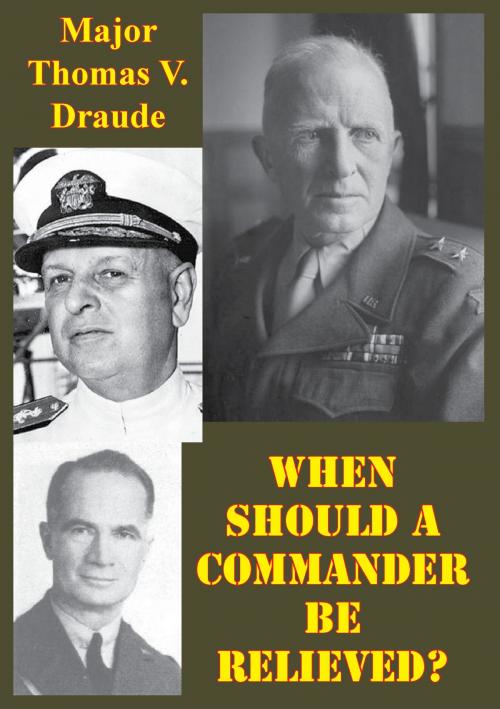When Should A Commander Be Relieved?
A Study Of Combat Reliefs Of Commanders Of Battalions And Lower Units During The Vietnam Era
Nonfiction, History, Military, Vietnam War, Asian, United States| Author: | Major Thomas V. Draude | ISBN: | 9781782896951 |
| Publisher: | Normanby Press | Publication: | August 15, 2014 |
| Imprint: | Normanby Press | Language: | English |
| Author: | Major Thomas V. Draude |
| ISBN: | 9781782896951 |
| Publisher: | Normanby Press |
| Publication: | August 15, 2014 |
| Imprint: | Normanby Press |
| Language: | English |
This study attempts to determine when commanders of battalions and lower units should be relieved during combat. The investigation analyzed actual reliefs during the Vietnam era to determine why the commanders were relieved, the availability of replacements, the role of counselling, and the effect on the unit.
Investigation reveals that most reliefs were not caused by a single deficiency but rather by a combination of perceived shortcomings. Mission failure was not a significant reason for relief. Captains and lieutenants were more likely to be relieved than were lieutenant colonels. Replacements for the relieved commanders were usually available. Most reliefs were effected without prior counselling. The effect of the relief on the unit depended primarily on the unit's evaluation of the relieved commander's leadership and popularity.
Further examination of the causes and effects of reliefs produced guidelines for commanders to consider before relieving a subordinate commander.
This study attempts to determine when commanders of battalions and lower units should be relieved during combat. The investigation analyzed actual reliefs during the Vietnam era to determine why the commanders were relieved, the availability of replacements, the role of counselling, and the effect on the unit.
Investigation reveals that most reliefs were not caused by a single deficiency but rather by a combination of perceived shortcomings. Mission failure was not a significant reason for relief. Captains and lieutenants were more likely to be relieved than were lieutenant colonels. Replacements for the relieved commanders were usually available. Most reliefs were effected without prior counselling. The effect of the relief on the unit depended primarily on the unit's evaluation of the relieved commander's leadership and popularity.
Further examination of the causes and effects of reliefs produced guidelines for commanders to consider before relieving a subordinate commander.

![Cover of the book The Invasion of the Crimea: Vol. I [Sixth Edition] by Major Thomas V. Draude](https://www.kuoky.com/images/2017/january/300x300/9781787203426-fpc1_300x.jpg)



![Cover of the book The Invasion of the Crimea: Vol. IX [Sixth Edition] by Major Thomas V. Draude](https://www.kuoky.com/images/2017/january/300x300/9781787203464-j287_300x.jpg)







![Cover of the book With Havelock From Allahabad To Lucknow [Illustrated Edition] by Major Thomas V. Draude](https://www.kuoky.com/images/2014/august/300x300/9781782894704-rmkg_300x.jpg)

